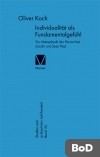Dieses Buch rekonstruiert erstmals die faszinierende Geschichte einer Reihe fiktiver Totengespräche, die zwischen 1729 und 1734 – anonym oder unter Pseudonym und sämtlich als Flugschriften veröffentlicht – in Deutschland erschienenen sind. Die Protagonisten dieser Gespräche gehören zu den berühmtesten Denkern der Frühaufklärung (u. a. Chr. Thomasius, A. H. Francke, J. Fr. Budde, N. H. Gundling) und Philosophen des 17. Jahrhunderts (Descartes, Leibniz, Bekker). In den fünf Jahren, in denen die Dialoge erschienen, lösten sie auf verschiedenen Feldern (philosophischen, theologischen, ökonomischen, persönlichen) scharfe Kontroversen aus. Die Wechselbeziehungen zwischen allen Texten und häufig sogar ihre Existenz waren bisher jedoch völlig unbekannt.
Die Arbeit weist die Zuordnung der untersuchten Dialoge zu einem einzigen, einheitlichen Korpus von Totengesprächen nach, rekonstruiert ihre Genese, interpretiert die in den Gesprächen inszenierten Kontroversen, widerlegt die – lange angenommene – Verfasserschaft des sächsischen Journalisten David Fassmann und versucht, dem Umfeld der Autoren anonymer philosophischer Flugschriften auf die Spur zu kommen. Die Integration von gewöhnlich getrennten Forschungsfeldern (clandestine Literatur, Anonymität, Flugpublizistik, philosophischer Dialog) und die Aufmerksamkeit für Kreise, die sich »am Rande« des universitären Establishments befanden, eröffnen neue Perspektiven auf die Debatten und Strömungen der deutschen Frühaufklärung.
This book reconstructs the history of a set of “dialogues of the dead” published in Germany between 1729 and 1734. The protagonists of the texts, all published anonymously or under pseudonyms, include some of the most famous philosophers of the 17th century (René Descartes, Gottfried W. Leibniz, Balthasar Bekker), alongside German philosophers and theologians of the early 18th century (Christian Thomasius, August Hermann Francke, Johann Franz Budde, Nikolaus Hieronymus Gundling, Andreas Rüdiger, Johann Friedrich Mayer, Johann Wilhelm Petersen), for the most part or strongly influenced by Pietism. During the five years in which the dialogues appeared, the texts triggered a heated debate on several levels: philosophical, theological, economic and personal. For several reasons, the reciprocal connection between these dialogues – and often their mere existence – has remained unknown. The published dialogues are currently scattered among German libraries, often bound together with unrelated contemporary texts. Since their authors sold the texts as Flugschriften (unbound cheap prints), they only survive in few copies until today, as they were not intended for careful preservation in private libraries. In rare cases the dialogues are mentioned in scholarly studies and bibliographies, and then they are almost always attributed to the Saxon journalist David Fassmann, at the time the most famous German author of dialogues of the dead.
The author of this study demonstrates that these dialogues form a coherent corpus, reconstructs their composition, and interprets the controversies ‘staged’ by the authors of the texts using the fictitious protagonists. Research on the philosophical and theological underground of early 18th-century universities in Central Germany resulted in refuting Fassmann’s authorship of all texts, establishing a relationship between the symbolic illustrations and the content of the texts and shedding some light on the concrete interactions between engravers, university circles, authors, and publishers in the early German Enlightenment.
The book shows how the integration of usually separate research fields (clandestine literature, anonymity, ‘street literature’, philosophical dialogue) and the attention to social groups placed at the fringe of the ‘established’ German academic milieus (students, engravers) could contribute to the telling of several vicissitudes of the German Enlightenment from a new perspective.
„Nicht zuletzt werden die Universitäts- und Wissenschaftsgeschichte aus der Analyse der Philosophischen Totengespräche der Frühaufklärung Nutzen ziehen, aber auch die Literaturwissenschaft wird unter anderem wichtige Anregungen dazu empfangen, wie sich eine besondere fiktionale Textsorte zur Geschichtsschreibung und umgekehrt verhält.“
Hanspeter Marti, Daphnis 46, 2018
„(A) fascinating study (...) Quite apart from the mass of interesting information she provides, Riccarda Suitner can be credited with having salvaged a genre, not only neglected but on the verge of complete disappearance, which tells us much about the intellectual climate in Germany in the first half of the eighteenth century.“
Alastair Hamilton, Church History and Religious Culture 97, 2017
"Suitner hat eine material- und aspektreiche Studie vorgelegt, in der sie ihre hohe kulturwissenschaftliche Kompetenz unter Beweis stellt. Der Gegenstand mag zunächst peripher erscheinen, aber die Untersuchung dokumentiert, wie aufwändig eine ideengeschichtliche Arbeit ist, die Zuverlässigkeit beansprucht." Frank-Rutger Hausmann, Historische Zeitschrift, 306, 2018
"Si tratta di opere poco o per nulla studiate. Chi cerchi di accostarvisi si trova infatti di fronte a una sorta di paradosso: nonostante nel Settecento abbiano goduto di enorme fortuna, tanto da creare una vera e propria nicchia editoriale, i Dialoghi sopravvivono in pochissimi esemplari per di più oggi dispersi tra le varie biblioteche tedesche (...). Ebbene, Die philosophischen Totengespräche der Frühaufklärung è un interessante viaggio in tutto questo." Francesco Paolo de Ceglia, Francesco Paolo de Ceglia anno III, 2018
"Suitner is extremely good at reconstructing the dynamics of the market for such inexpensive pamphlets, which included widespread plagiarism and the printing of pirated copies as well as the exploitation of precarious authors with a university background and of equally precarious graphic artists who produced emblematic engravings for the title pages (...) the dialogues studied in her book shed new light on the early German Enlightenment." Andreas Blank, Renaissance Quarterly LXXI , No. 2, 2018
















